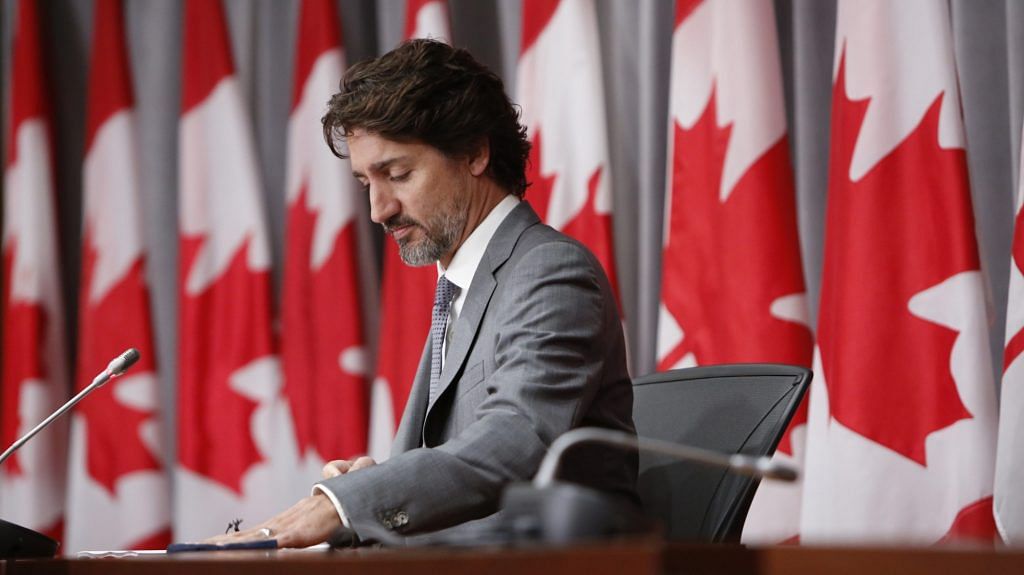New Delhi: Canada may have voiced concerns over the ongoing farmer protests in India against the central government’s three farm bills, but in the past, it has never left any opportunity to challenge India’s farm subsidies at the World Trade Organisation (WTO).
On Tuesday, while addressing members of the Sikh community in Canada, Prime Minister Justin Trudeau said the situation of Indian farmers agitating against the farm bills is “concerning” and that his country will “be there to defend the rights of peaceful protest”. India, however, rejected the comments as being “ill-informed”.
Though willing to defend India’s protesting farmers, Canada has always been vocal at the WTO against India’s food subsidy programmes for its staple crops.
A Geneva-based trade official said Canada, Brazil and New Zealand were “most vocal challengers” to India exceeding the permitted limit of its rice subsidy in 2018-19.
Canada, along with other developed countries like the US, Japan and Australia, have challenged India at WTO meetings when it sought to defend its agricultural programmes like the minimum support price (MSP) for staple crops such as rice, wheat and pulses.
Also read: Farmers’ protest a big challenge for Modi. Bigger than demonetisation, GST
Canada questioned India’s exceeding food subsidies
Developed countries, including Canada, have been raising the issue of India’s food subsidies at WTO meetings for years. With the adoption of a peace clause in 2013, the pressure intensified.
In July this year, Canada, along with the US, Japan and the European Union had questioned India on exceeding the permitted limits on food subsidies given for rice production — also called de minimis levels under WTO norms — to farmers in 2018-19, official sources told ThePrint. The de minis level is determined as 10 per cent of the value of food production.
“In its responses, India reiterated its compliance with the WTO rules, particularly on the Agreement on Agriculture as well as the Bali Ministerial Decision. It maintained the marketing year 2018-2019 was the only year that it exceeded the de minimis support for rice, which explains why it didn’t notify the public stockholding programme for rice prior to that period,” said the trade official.
In order to continue offering food subsidies to the farmers, India had to invoke the peace clause. The peace clause gives protection to developing countries like India, which run public food stockholding, from being dragged into disputes in case they exceed their de minis level.
India, along with other developing countries like Brazil, China and South Africa, obtained a so-called ‘peace clause’ in 2013 under the WTO during one of its ministerial meetings that was held in Bali, Indonesia.
But even after obtaining the peace clause, India had to fight against the developed countries, including Canada, to continue using it during the 2015 Nairobi ministerial meeting.
‘Canadians act at behest of their major trade partners’
In July, Canada had registered 25 questions to India with regard to its farm subsidy and also explained the impact such food subsidies will have on global agricultural trade.
Subsequently, in September, a slew of questions were posed to India by Canada and other developed nations regarding its “multiple agriculture policies and transparency issues arising from its new domestic support notifications”, said the above-quoted trade official.
The official added, “A good number of new questions were asked regarding India’s new domestic support notifications, its various support programmes and public stockholding programmes (which are meant to benefit the farmers). Some key questions include the potential impact on the global market of India’s high amount of food stocks, and whether India is breaching its support limit for other farm goods, given India recently notified its excessive de minimis support for rice in 2018-2019.”
From 2015-18, attempts were made by Canada and other developed nations to also question India’s food stocks programme.
In July 2019, several developed countries, including Canada, made an attempt to take India to the WTO dispute settlement body over the MSP issue.
Jayant Dasgupta, former ambassador of India to the WTO, said Canada has repeatedly questioned India’s farm policies.
“It is not in keeping with diplomatic protocol. Canada has questioned India’s farm policies time and again, along with others like the Americans and Australians. Canadians also act at the behest of their major trade partners at the WTO. But as far as their (Canada’s) trade interest goes, they are not large exporters of farm produce, like the Americans or Australians,” he said.
Also read: Shambles over farmers’ protest shows Modi-Shah BJP needs a Punjab tutorial
